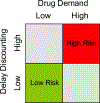Reinforcer Pathology: The Behavioral Economics of Abuse Liability Testing
- PMID: 27509043
- PMCID: PMC9812002
- DOI: 10.1002/cpt.443
Reinforcer Pathology: The Behavioral Economics of Abuse Liability Testing
Abstract
Understanding the abuse liability of novel drugs is critical to understanding the risk these new compounds pose to society. Behavioral economics, the integration of psychology and economics, can be used to predict abuse liability of novel substances. Here, we describe the behavioral economic concept of reinforcer pathology and how it may predict the use of novel drugs in existing drug-users and initiation of use in the drug-naive.
© 2016 American Society for Clinical Pharmacology and Therapeutics.
Figures


References
-
- Bickel WK, Johnson MW, Koffarnus MN, MacKillop J, Murphy JG. The behavioral economics of substance use disorders: reinforcement pathologies and their repair. Annu Rev Clin Psychol. ncbi.nlm.nih.gov; 2014;10:641–77. - PMC - PubMed
-
- Bickel W, Moody L, Snider S, Mellis A, Stein J. & Quisenberry A. The behavioral economics of tobacco products: Innovations in laboratory methods to inform regulatory science. In: Hanoch Y Rice T, editor. Behavioral Economics and Health Behaviors: Key concepts and current research. 2016. p. in press.
-
- Murphy JG, MacKillop J. Relative reinforcing efficacy of alcohol among college student drinkers. Exp Clin Psychopharmacol. psycnet.apa.org; 2006. May;14(2):219–27. - PubMed
-
- Madden GJ, Petry NM, Badger GJ, Bickel WK. Impulsive and self-control choices in opioid-dependent patients and non-drug-using control patients: Drug and monetary rewards. Exp Clin Psychopharmacol. American Psychological Association; 1997. Aug;5(3):256. - PubMed
MeSH terms
Grants and funding
LinkOut - more resources
Full Text Sources
Other Literature Sources
Medical

